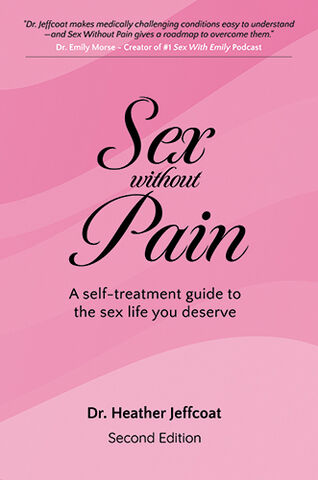What's the Connection Bewteen Eating Disorders and Pelvic Floor Dysfunction?
Read on for some answers.
Eating disorders are unfortunately common, with at least 9% of people worldwide suffering from an eating disorder. This translates to 28.8 million Americans will have an eating disorder in their lifetime. There are different types of eating disorders (ED) including anorexia nervosa, bulimia nervosa, and binge eating disorder. Other than the typical psychological and social implications that these eating disorders may cause, they also can affect our pelvic health and lead to pelvic floor dysfunction. It can lead to incontinence (either urine or feces), prolapse, increased urinary urge, pelvic pain (possibly associated with polycystic ovarian syndrome or PCOS), constipation, and sexual dysfunction.
Sometimes suffering from anorexia nervosa can affect hormone levels and in this case, it often decreases estrogen levels. In addition, because of the food restrictions, many people may also suffer from low protein. Both the low estrogen and protein levels can contribute to structural changes in the puborectalis muscle negatively. The puborectalis acts as a sling around your rectum and is crucial in our ability to defecate as well as keep us from leaking. As a result of the structural changes that occur in the puborectalis muscle, this may lead to fecal incontinence.
Urinary Incontinence & Eating Disorders
Hextall, et al. also found that 40% of women with anorexia nervosa experienced stress and urge urinary incontinence compared with their healthy matched controls. Stress urinary
incontinence is related to urine leakage during activities such as exercising, laughing, coughing, and sneezing. Urge incontinence is associated with a strong urge that leads to leakage before reaching the toilet. Eating disorders are also more commonly seen in athletes. Athletes that also suffer from eating disorders are almost 50% more likely to have urinary incontinence, and more likely to experience increased urinary urgency than athletes with no signs of eating disorders.
Constipation and Pelvic Organ Prolapse
In addition, due to dietary restrictions, excessive intake, or purging, it is common to experience chronic constipation in those with eating disorders. Unfortunately, this can lead to habitual straining while defecating, painful bowel movements, hemorrhoids, and/or abdominal discomfort! Check out the blog: "Chronic Constipation: The Basics" for more information. Over time, continued habitual straining can lead to prolapse of pelvic organs (a downward shift in pelvic organs due to poor support) which can lead to pelvic heaviness or feelings of something is coming out vaginally. Check out this blog for more information on pelvic organ prolapse.
Bulimia Nervosa & Polycystic Ovarian Syndrome
A common comorbidity that we see specifically in those who suffer from bulimia nervosa is polycystic ovarian syndrome or PCOS. Kimmel, et al. who wrote a summary on the literature found that 75% of women with bulimia nervosa also had polycystic ovaries. On the other hand, about 33% of women with polycystic ovaries admitted to bulimic eating patterns. Females with PCOS, although sometimes asymptomatic, often experience cramping pain (not necessarily associated with menses), bloating, bodily pain, among other symptoms.
Sexual Dysfunction & Eating Disorders 
Last, but not least, we often find sexual dysfunction in in those with eating disorders. Very often, women with eating disorders experience decreased libido, lower sexual functioning, and increased sexual anxiety. Clinically we find that those with increased anxiety in general, especially as it relates to sexuality, can lead to pain with sexual intercourse. Sexuality involves an integration of biological, social, and psychological systems, and can be further impacted if suffering from any type of eating disorder. This can easily manifest physically in the pelvic floor muscles, and make orgasms as well as sexual penetrative intercourse painful.
Help with Eating Disorders and Pelvic Floor Dysfunction
Luckily, there is help! If you are suffering from any of the symptoms aforementioned, regardless of whether you have an eating disorder or not, there are manual techniques, exercises, stretches, and education that can help improve your symptoms. Most pelvic floor physical therapists are trained to help improve incontinence, work on abdominal viscera manually to help relieve any abdominal discomfort/bloating symptoms, educate on toileting strategies to minimize constipation, educate on strategies to decrease prolapse discomfort, and improve overall sexual functioning. Along with the help and guidance of an eating disorder specialist, please know we are here, ready to help! Schedule your in-person or telehealth appointment at Femina.
References:
- National Association of Anorexia Nervosa and Associated Disorders. Eating Disorder Statistics: General & Diversity Stats: ANAD. November, 3 2021. Accessed on Jan 20, 2022. https://anad.org/eating-disorders-statistics/
- Bo K, Borgen JS. Prevalence of stress and urge urinary incontinence in elite athletes and controls. Medicine and Science in Sports and Exercise 2001; 33(11); 1797-1802.
- Cortes E, Singh K, Reid WMN. Anorexia nervosa and pelvic floor dysfunction. Int Urogynecol J 2003; 14: 254-255. Doi: 10.1007/s00192-003-1082-z.
- Hextall A, Majid S, Cardozo L, et al. A prospective controlled study of urinary incontinence symptoms in women with severe anorexia nervosa. Neurourol. Urodyn. 1999; 18:398-399.
- Kimmel MC, Ferguson EH, Zerwas S, et al. Obstetric and Gynecologic Problems Associated with Eating Disorders. Int J Eat Disord 2016 March; 49(3): 260-275. doi:10.1002/eat.22483
- Martin ML, Halling K, Eek D et al. Understanding polycystic ovary syndrome from the patient perspective: a concept elicitation patient interview study. Health and Quality of Life Outcomes 2017; 15:162. Doi: 10.1186/s12955-017-0736-3













